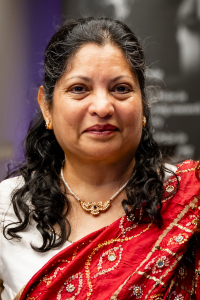Recognizing Heritage: My Journey of Health, Connection and Leadership in Osteopathic Medical Education
Published May 28, 2024
Inside OME

By Naunihal Zaveri, PhD, FIAMSE, FNAOME, chair of microbiology, immunology & pharmacology, associate professor of pharmacology, Arkansas Colleges of Health Education
My name is Naunihal (Nina) Zaveri, and I am an Asian American. I was born and raised in Asia (in India), immigrated to the United States in 1988 and became a naturalized citizen. My past 36 years encompass a professional journey in which I’ve accomplished various milestones—getting an MS and a PhD in Pharmacology, followed by postdoctoral training, working as a research scientist doing drug discovery & development and becoming a medical educator in allopathic and osteopathic medical schools. Alongside that journey came the blessings of getting married and having children, who are now considered first generation Asian Americans.
Does it really matter where I came from, to get to where I am today? After all, I consider myself a human being who inhabits this planet just like the rest of us, and whose goal is to make this world a better place for everyone. And yet, the last four decades of living in the United States have made me realize that it does matter where I came from. It affects how I am perceived by others, and it has provided me with lived experiences that are directly related to my cultural, racial and ethnic identity.
This brings me to reflect on why I belong to the osteopathic medical education community, and how the person is a unit of mind, body and spirit. In April 2021, during the pandemic and after starting a new job in an osteopathic medical school, I met the poetess Yvette Perry in a Zoom call through The Good Listening Project, a program available through the American Association of Medical Colleges and the National Endowment for the Arts. Yvette listened to me as I talked about feeling depressed and surrounded by darkness, and composed a poem that captured my thoughts on the darkness of the previous four years in the United States, and a new sense of hope I felt as I saw spring blooming on trees after the dark cold months of winter. Since then, I have undergone training in leadership, DEI (diversity, equity and inclusion) and learned about positive psychology through the works of Martin Seligman (1, 2), Shawn Achor (3) and others.
What have I learned from being an Asian American in the osteopathic medical education world? I have realized that while what happens to me may be influenced by my racial, ethnic and religious identity, how I choose to react and respond is up to me. As Mahatma Gandhi said, “Our greatest ability as humans is not to change the world, but to change ourselves.” Striving to make changes to improve oneself is something I am committed to. In medical education, we often hear the phrases “burnout, stress, anxiety and erosion of compassion and empathy.” How can we change this climate instead to be one of “wellness, joy, compassion, flourishing and excellence?”
I believe it can be done by adopting an attitude of positivity and empathy, and a commitment to change from each one of us who belongs to this community. Being united as a community of medical educators, even when there are differences of opinion and thought, and diversity in race, ethnicity and gender, is what will enable each one of us to move towards flourishing and thriving. After all, a rising tide lifts all boats.
I am committed to making small but positive changes every day. An acronym I use is “PREMA,” which is modified from the writings of Seligman and stands for Positive Relationships, Engagement and Meaningful Accomplishments. The word “PREM” in the Hindi language means love, and I make efforts every day to love what I do and love my fellow human beings. I have been a part of AACOM and the National Board of Osteopathic Medical Examiners for 14 years now and believe these organizations have provided me the support to grow, learn and flourish as a medical educator. I encourage you to join these organizations so that you will learn and grow as well. As James Keller said, “A candle loses nothing by lighting another candle.” In medicine and healthcare, practitioners, professionals, educators, administrators and students alike can benefit from these words. When you see a fellow coworker’s candle extinguished, lean over and light their flame; you will only serve to illuminate and dispel the darkness. And the illumination will reveal that not just Asian Americans and Pacific Islanders, but all races, ethnicities and nations are a part of the rich tapestry of humanity that needs healing and love.
References:
- Seligman, Martin E.P. “Authentic Happiness: Using the New Positive Psychology to Realize your Potential for Lasting Fulfillment”, 2002, Atria paperback.
- Seligman, Martin E.P. “Flourish: A Visionary New Understanding of Happiness and Well- being”, 2012.
- Achor, Shawn, “The Happiness Advantage: How a Positive Brain Fuels Success in Work and Life”, 2018.
